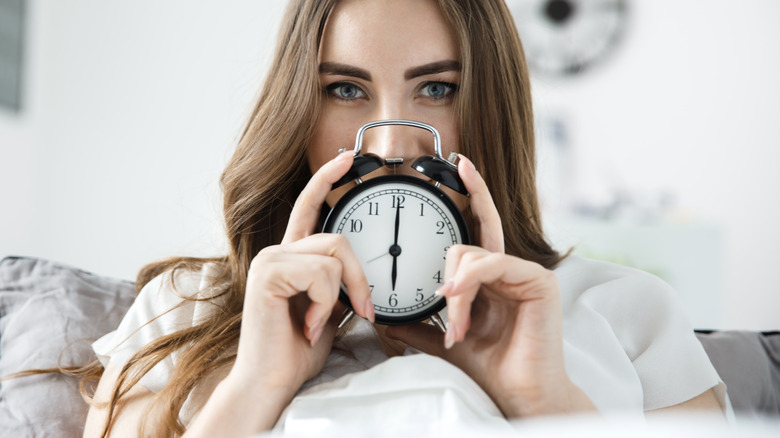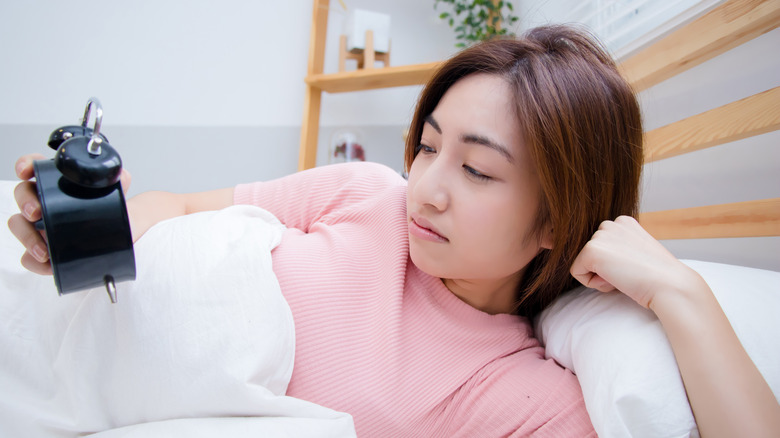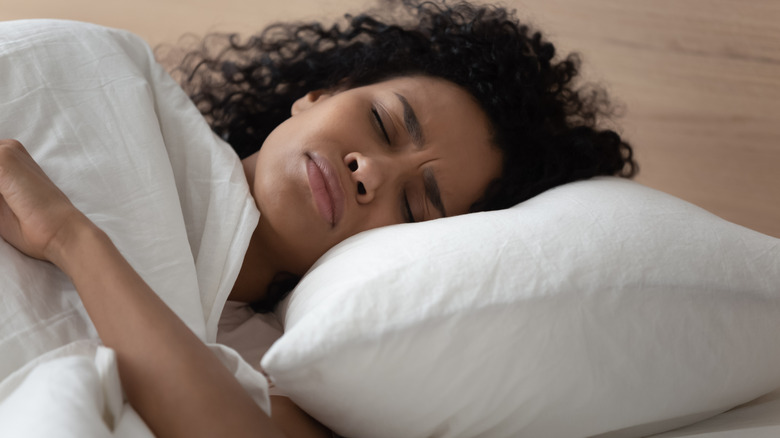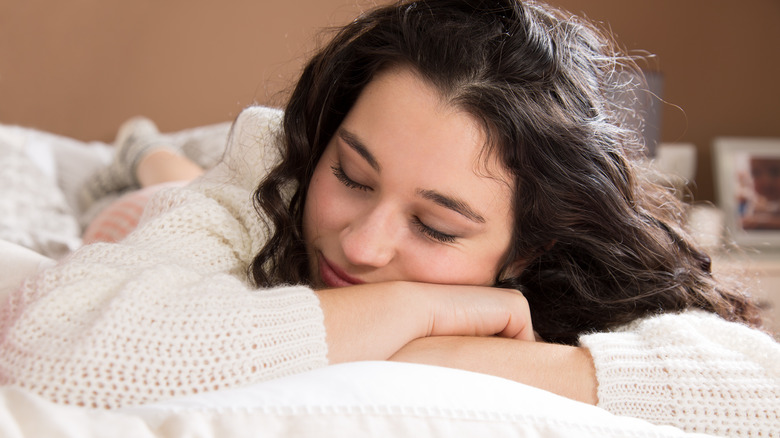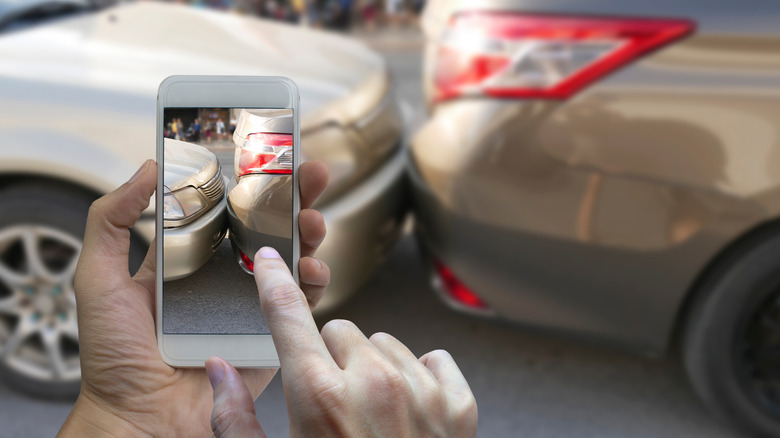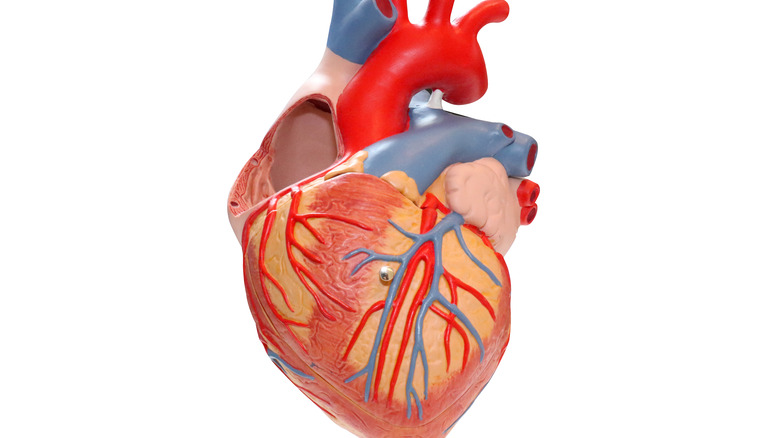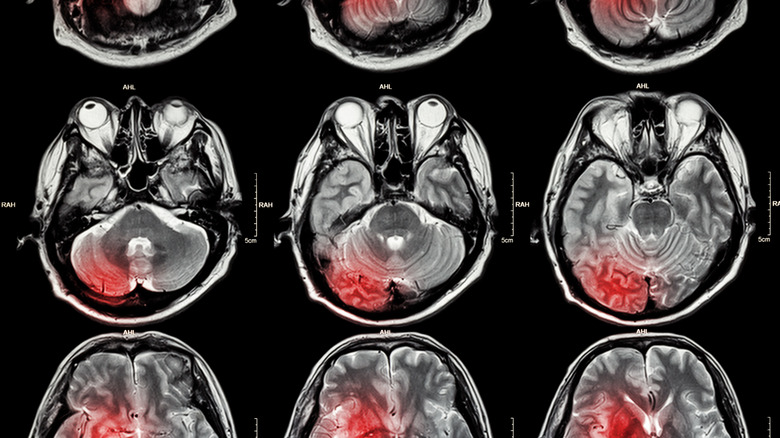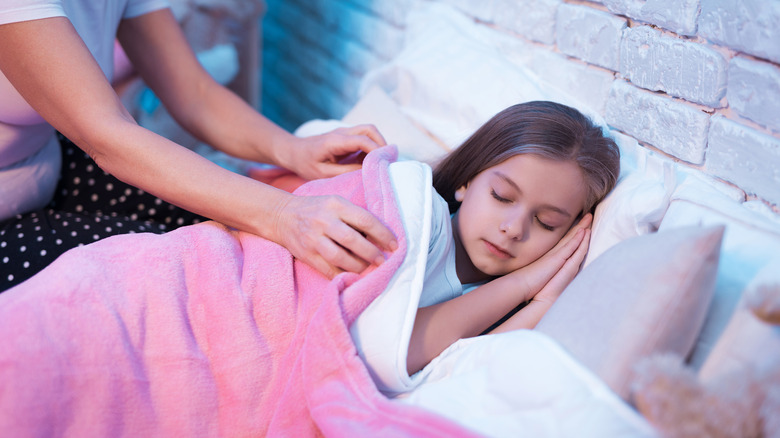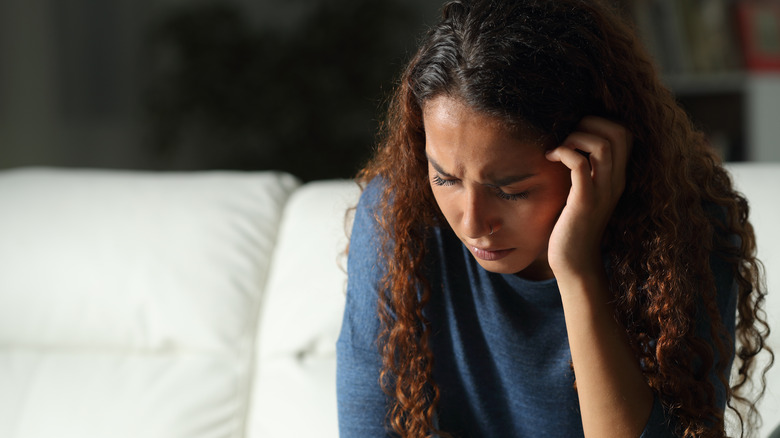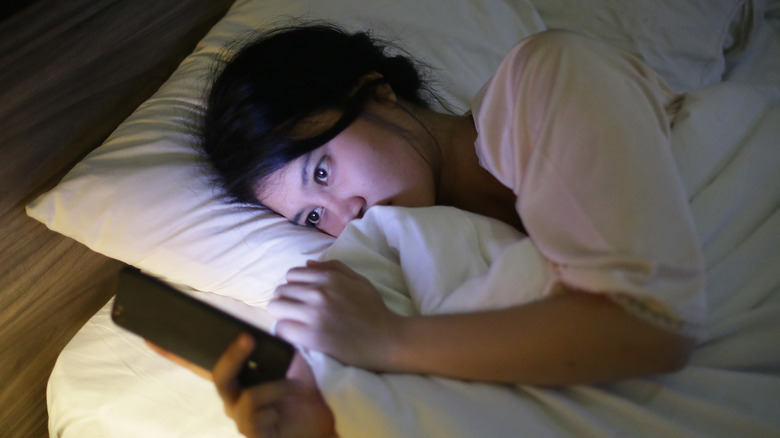What Daylight Savings Time Does To Your Body
Oh, daylight savings time. If someone tries to tell you that time travel isn't possible, chances are they live in a place that doesn't implement daylight savings time. That's because every spring and autumn, millions of folks either set their clocks forward or back one hour, ostensibly to see more sunshine in a day and maximize daylight hours. According to CNN, the United States (except Hawaii and most of Arizona) officially started springing forward in spring and falling back in fall in 1966 in an effort to reduce fuel usage.
Not everyone is happy about having to observe daylight savings time, however, because of the many ways in which it has an impact on a person's physical and mental health. Humans are creatures of habit, after all, so implementing such a significant time change can throw our routines out of whack, causing a sense of disorientation and general malaise.
So what exactly happens to your body when you endure the changes that come with starting and ending daylight savings time, according to science? Read on to find out!
Daylight savings time disrupts your circadian rhythm
Sleep is super important for your health for a variety of reasons. That includes bodily regulation, according to Dr. Chris Winter, president of the Charlottesville Neurology and Sleep Medicine clinic. "Sleep is a kind of outward symbol of the timing processes of our body," he shared in an interview with NBC News. "Our bodies function on an internal schedule, from hormone release to body temperature to cognition — and sleep is linked to them all."
Additionally, according to Dr. Martin Young, an associate professor in the Department of Medicine at the University of Alabama at Birmingham, daylight savings time shifts can have an impact on that regulatory schedule. "When there is a sudden change in the timing of environmental cues — daylight saving time, traveling through time zones, shift work — a dyssynchrony occurs between our internal circadian clocks and our behaviors, such as our sleep/wake cycle," he explained in an interview with Yahoo! Lifestyle. "This is because there is a lag in the 'resetting' of our internal clocks." And that can have an impact on the body.
Daylight savings time can make you feel sleepier
Given the impact that daylight savings time can have on your circadian rhythm, it's not surprising at all that it can also make you feel sleepier, according to Dr. Natalie D. Dautovich, an assistant professor at Virginia Commonwealth University. "A change in the timing of our sleep, even by just an hour, can result in feelings of 'jet lag' until we adjust to the new change," she revealed in an interview with Yahoo! Lifestyle. "As a result, you may feel sluggish, sleepy during the day, and have difficulty concentrating while adjusting to the change." That explains why everyone looks so tired in the days just after daylight savings time begins and ends.
You might notice that this is more of an issue when daylight savings ends, and, according to Dautovich, that's due to how much daylight you're getting. "A benefit of the time change in the fall is earlier exposure to daylight, which can help to synchronize circadian rhythms to the new time," she continued.
You might be tempted, but don't take a nap after daylight savings time changes
No matter if you're springing forward or falling back, daylight savings time changes can throw you off and make your super tired. You might be tempted then to plop down for a nap on your lunch hour or grab some Zs when you get home from work. But according to Dr. Chris Winter, president of the Charlottesville Neurology and Sleep Medicine clinic, this might not be the best approach for combating your fatigue. "This is where people fall off the wagon," he explained in an interview with NBC News. "They're tired so they nap in the middle of the day, but then when it's time to go to bed that night or the next night they're not ready, which can have a bad snowball effect." And that's no good!
Instead, it's better to push through that midday slump so you're ready to sleep at bedtime. That way you'll adjust to the new schedule faster and stop feeling tired when you're usually alert and chipper.
Feeling cranky? That might be because of daylight savings time
Have you noticed that every time you deal with the time changes that come with daylight savings time shifts, you're crankier than usual? Are you more irritable than your baseline and more sensitive to what's happening around you?
Well, that's just one more thing you can blame on changing the clocks, especially when you spring forward, as you're likely losing about 40 minutes of sleep. And that sleep deprivation has consequences, according to Dr. Charles Czeisler, chief of sleep medicine at Brigham and Women's Hospital. "We know from small studies that in people who are sleep deprived, the amygdala, which is the emotional center of the brain, is much more reactive to disturbing images as compared to somebody who's well rested," he revealed in an interview with CBS News. And that can certainly make you feel more anxious, irritable, and stressed than usual, which can snowball if you're not careful. So be gentle with yourself!
You're more likely to have a car accident because of daylight savings time
Daylight savings time changes aren't just annoying, making people feel like zombies before the afternoon hours. In fact, springing forward and falling back can have dangerous consequences that you need to prepare for, according to Dr. Shanon Makekau, chief of pulmonology and sleep at Kaiser Permanente's Moanalua Medical Center. "The resultant sleep deprivation that occurs can cause a variety of cognitive effects, including diminished attention and concentration as well as impairments in more complex mental functions such as short-term memory and decision-making," she shared in an interview with Refinery29. "These negative cognitive changes increase the incidence of accidents — in particular, motor vehicle and work-related — poor performance, and reduced productivity across all activities, including at home, school, and work." Yikes!
Research confirms Makekau's statement, as a 2001 study in the journal Sleep Medicine found that there's a small increase in fatal car accidents after shifts in daylight savings time. Be careful out there!
Daylight savings time can affect your appetite
Many people have a daily routine that, for the most part, they stick to on a regular basis. Part of that includes when you take the time to eat meals, something that your body gets accustomed to, according to Dr. Chris Winter, president of the Charlottesville Neurology and Sleep Medicine clinic. "Appetite in general is often not the body requesting food; it's the body anticipating food," he shared in an interview with NBC News. "When your body knows you eat lunch around 12:30 p.m. or so every day, it anticipates and prepares for the meal."
That's something that's affected by daylight savings time, which can shift the levels of ghrelin and leptin that you have in your body, thereby altering your appetite. "These two hormones are intimately associated with sleep, which is part of why when we're not sleeping well, we tend to overeat," he continued. "It's a tight hormonal balance and daylight-saving shifts can absolutely throw it off." That explains why you feel much hungrier than usual after shifting your clock forward or back.
Your cognitive function suffers because of daylight savings time
Do you ever wonder just how effective daylight savings time is at doing what it's supposed to? That's a good question, according to Timothy Morgenthaler, co-director of the Mayo Clinic's Center for Sleep Medicine. "Ever since the institution of daylight saving time, there has been controversy regarding whether it accomplishes its goals or not, and if so — at what cost," he posited in an interview with USA Today. To that end, Morgenthaler reviewed approximately 100 scientific papers to see what the data had to say about the impacts of changing the clocks.
One big takeaway from his review was that most people deal with sleep deprivation for about five to seven days after the time change. And that's going to have a significant effect on their cognitive function, causing them to struggle with memory issues, social interactions, and learning capacity. Here's hoping you don't have any tests the week after daylight savings!
Morgenthaler added that impacts are greater when springing forward as opposed to falling back.
Daylight savings time increases your risk of heart attack
Believe it or not, but springing forward and falling back can have a noticeable impact on your heart health. First, the good news: Falling back can actually be good for your ticker, according to University of Colorado Boulder researcher Ken Wright. "Many adults in the U.S. don't get the recommended amount of sleep, which is a minimum of seven hours," he revealed in a news release (via the Denver Post). "So if on this 'fall-back weekend' people get that extra hour of sleep and get themselves into that seven-hour range, it seems to be associated with a reduced (health) risk." That's a good reason to catch some extra sleep, for sure.
However, that's the end of the positive stuff, as springing forward essentially negates any health benefit caused by daylight savings time. That's because there's a five percent increase in heart attacks the Monday after daylight savings time begins in the spring, which is a significant number. Unfortunately, that's just what the science says.
Daylight savings time might make you more at risk for a stroke
Can daylight savings time shifts increase your risk of having a stroke? That was a question that Finnish researcher Dr. Jori Ruuskanen had and wanted to find out more about. "Previous studies have shown that disruptions in a person's circadian rhythm, also called an internal body clock, increase the risk of ischemic stroke," he explained in a press release from the American Academy of Neurology. "So we wanted to find out if daylight saving time was putting people at risk."
To that end, Ruuskanen and other researchers got to work analyzing the incidences of stroke that occurred both directly after a daylight savings time transition and several weeks before or after the shift. They found that there is indeed an increased risk of stroke associated with daylight savings time, albeit a temporary one. Specifically, the risk of ischemic stroke increases by eight percent in the two days following the shift, then returns to normal. "Further studies must now be done to better understand the relationship between these transitions and stroke risk and to find out if there are ways to reduce that risk," Ruuskanen added.
Young children need to go to bed earlier because of daylight savings time
It's not just adults who feel the effects of daylight savings time changes, as, according to educational psychologist Reena B. Patel, your little ones will also notice the difference. "It's going to have a big impact on kids who are six months or 18 months or even a couple of years old," she shared in an interview with Refinery29. "They're usually on a set schedule and routine, and both the children and parents can find it difficult to adjust." That might make bedtime a little more difficult, as Patel suggests putting your kids to bed earlier than usual, which they will likely notice.
Additionally, if you have teenagers in the home, they're particularly susceptible to the effects of springing forward and falling back, according to Dr. André U. Aguillon, an assistant professor at the University of Toledo. "The effects of [daylight saving time] can have more impact on adolescents," he revealed in an interview with NBC News. "Not only do they require more sleep than adults, but their habitual sleep-wake timing is typically delayed."
Daylight savings time can make you feel depressed
For as nice as fall can be with its cooler temperatures and lower humidity, with it also comes shorter days and longer nights. And that combined with falling back for daylight savings time can cause an uptick in depression, according to Dr. Sandhya Kumar, an assistant professor of neurology at Wake Forest Baptist Medical Center. "The amount of daylight you're exposed to really can have an impact on mood and depression, especially for people with seasonal [affective] disorder," she explained in an interview with Health.
Kumar's statement is confirmed by science, too. According to a 2016 study in the journal Epidemiology, researchers concluded that transitioning from daylight savings time back to standard time in the fall caused an increase in depression diagnoses. This was over a period of ten weeks following the time change, which is a significant amount of time.
Conversely, there's no evidence that springing forward earlier in the year is associated with increased depression, which is good news.
Daylight savings time changes can increase cyberloafing at work
The impacts of switching to daylight savings time can also be felt in the office, according to Science Daily. Specifically, on the Monday after springing forward, people spend more time cyberloafing than usual, which is browsing the internet for personal reasons instead of working. The reason people become less productive at work is due to the fact that they lost sleep the night before, and therefore are less disciplined and self-regulatory than they normally would be. Being tired sure can cause problems!
Researchers at Penn State's Smeal College of Business came to this conclusion after they analyzed six years' worth of data from Google, which showed that entertainment-related searches rise the day after returning to standard time. This has the potential to have a negative impact on business, as they said that "global productivity losses from a spike in employee cyberloafing are potentially staggering." Because of this, the researchers urged policymakers to consider whether or not daylight savings time should be reevaluated.
Your biological clock will be impacted for up to a week after daylight savings time changes
Some people express a preference for falling back rather than springing forward as they feel it's an opportunity to get a little more sleep than usual, thanks to moving the clock backwards. But according to Dr. Helmut Zarbl, director of the Rutgers Environmental and Occupational Health Sciences Institute, that's not exactly the case. "You are not getting an extra hour of sleep; you are simply changing the phase," he explained in an interview with Medical Xpress. "As with any change in sleep cycles due to shift work, jet lag, etc., it takes about a week to reset your biological clock."
That's a long time to be out of sync with your body processes, so Zarbl encourages people to adjust as soon as possible to hasten the daylight savings time reset process. "The sooner you adapt, the sooner you will feel normal again, so adjust your eating and sleep schedules accordingly," he continued. "You change the clock at 2 a.m. on Sunday, so don't wait until Monday to make the necessary change."
Here's how to cope with daylight savings time changes
Considering all of the negative impacts that a daylight savings time shift can have on your body, the process really does sound like it's a terrible thing that makes you hungry, tired, cranky, and more susceptible to health problems. But there are things that you can do to minimize the effects that springing forward and falling back have on you, according to WebMD.
For one, make sure you're exposed to as much daylight as possible during the time shifts, and avoid using artificial light during bedtime. Additionally, ensure that your sleeping environment is well-prepared, and be mindful of your caffeine, alcohol, and dietary intake when it's time to adjust the clock. Also, use an eye mask and ear plugs if necessary, and create calming bedtime rituals like taking a hot bath or meditating to slow yourself down if need be. Finally, make sure you stick to consistent waking and sleep times. All of this can help you beat the change and restore you to your natural rhythms.
